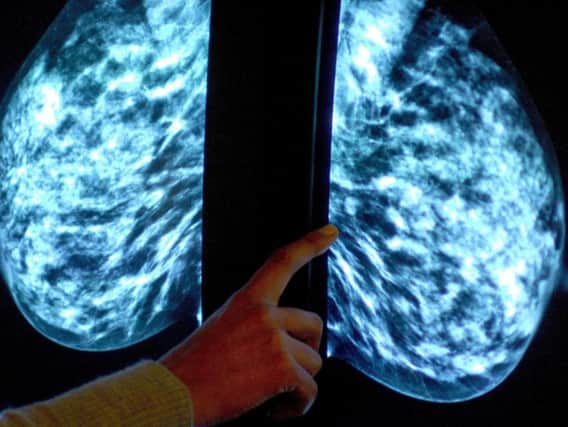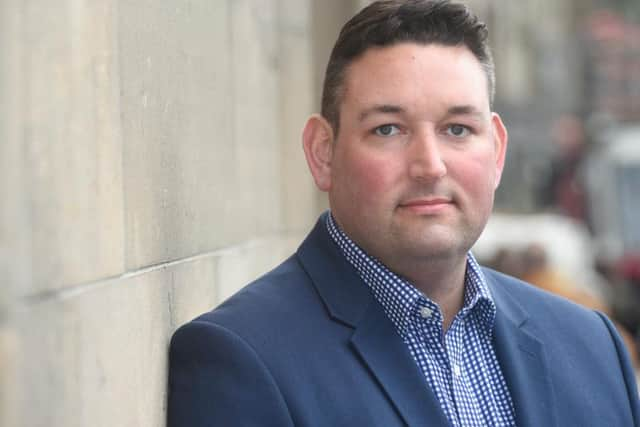Breast cancer screening rates in Scotland fall


A total of 71.2 per cent of eligible women attended for routine screening in the three years covering 2015/16 to 2017/18.
That is down from 71.7 per cent in the previous three-year period, and lower than than 74.9 per cent achieved in 2008/09 to 2010/11.
Advertisement
Hide AdAdvertisement
Hide Ad

In Glasgow, where the rate was lowest, fewer than two thirds (65.8 per cent) of women attended, the most recent figures revealed.
And in the most deprived parts of Scotland less than three out of five women attended for screening.
ISD Scotland data covering the years 2016/17 and 2017/18 showed just 58.5 per cent of females in these communities attended - compared to 79.1 per cent of women in the least deprived areas.
The report said: "Ideally eight out of ten women invited for screening would attend their appointment, this is the achievable standard with the minimum being seven in ten women."
It added that "even though nationally the standard is being met the uptake rate has been falling consistently".
With 84.6 per cent of cancer cases in women in 2017/18 being invasive breast cancer, it also stressed the importance of early detection.
More than half (55.1 per cent) of the breast cancer cases that year were found when the tumour was less was 15mm in size.
The report stated: "Such small tumours are unlikely to be detected by physical examination, highlighting the importance of screening in the early detection of breast cancer as picking up small cancers is one of the key methods to achieve the aim of reducing deaths due to breast cancer."
Advertisement
Hide AdAdvertisement
Hide AdTory health spokesman Miles Briggs said: "This declining breast cancer screening rate is particularly concerning given that the earlier cancer is caught, the better the outcome.
"There cannot be any excuse for health boards not to meet this important screening target. The SNP Government must ensure that all women have access to early breast cancer screening, regardless of where they live."
He demanded: "The SNP must not wait until more women's lives are at risk, they must take steps to work with NHS boards and ensure screening programmes are working effectively now."
Labour health spokeswoman Monica Lennon said reversing the fall in breast screening rates must be a priority for Health Secretary Jeane Freeman.
Ms Lennon stated: "Routine breast screening is crucial to catching cancer early and saving lives. That is why it is so disappointing to see that the uptake of breast screening is going backwards under the SNP.
"The country's four largest health boards all failed to meet the minimum acceptable standard, and the poorest women are far less likely to attend these appointments than those from wealthier communities.
"Scotland needs to reverse this trend to save lives, and that should be a priority for the health secretary."
Liberal Democrat health spokesman Alex Cole-Hamilton added: "We know that early diagnosis of breast cancer can make all the difference to successful treatment, so it's extremely bad news to see uptake on a prolonged downward slide.
Advertisement
Hide AdAdvertisement
Hide Ad"It's clear the Scottish Government needs to do more to reverse this worrying trend and encourage people to take the time out of busy days to get to the doctor and take up these tests."
A Scottish Government spokeswoman welcomed that "uptake rates continue to exceed the Healthcare Improvement Scotland clinical standard for uptake of 70%".
She added: "To ensure we keep pace with increasing population and changes in technology and lifestyles, a new review of breast screening will look at everything from invitation processes, technology and future requirements to further increase uptake of screening.
"We are also investing £5 million in national cancer screening programmes, including breast, to encourage those who are eligible to take up their invite. This funding is targeted towards increasing participation in areas of deprivation and other areas where uptake is lowest.
"We know that the earlier a cancer is diagnosed the easier it is to treat which is why we launched our £42m Detect Cancer Early (DCE) Programme in 2012. DCE's latest campaign - Survivors - highlighted the fact that more people are surviving cancer than ever before and getting checked early plays a big part."
